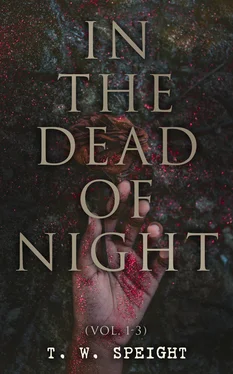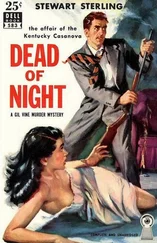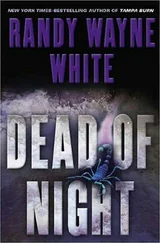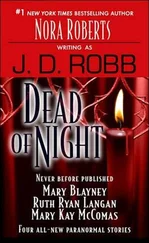T. W. Speight - In the Dead of Night (Vol. 1-3)
Здесь есть возможность читать онлайн «T. W. Speight - In the Dead of Night (Vol. 1-3)» — ознакомительный отрывок электронной книги совершенно бесплатно, а после прочтения отрывка купить полную версию. В некоторых случаях можно слушать аудио, скачать через торрент в формате fb2 и присутствует краткое содержание. Жанр: unrecognised, на английском языке. Описание произведения, (предисловие) а так же отзывы посетителей доступны на портале библиотеки ЛибКат.
- Название:In the Dead of Night (Vol. 1-3)
- Автор:
- Жанр:
- Год:неизвестен
- ISBN:нет данных
- Рейтинг книги:5 / 5. Голосов: 1
-
Избранное:Добавить в избранное
- Отзывы:
-
Ваша оценка:
- 100
- 1
- 2
- 3
- 4
- 5
In the Dead of Night (Vol. 1-3): краткое содержание, описание и аннотация
Предлагаем к чтению аннотацию, описание, краткое содержание или предисловие (зависит от того, что написал сам автор книги «In the Dead of Night (Vol. 1-3)»). Если вы не нашли необходимую информацию о книге — напишите в комментариях, мы постараемся отыскать её.
In the Dead of Night (Vol. 1-3) — читать онлайн ознакомительный отрывок
Ниже представлен текст книги, разбитый по страницам. Система сохранения места последней прочитанной страницы, позволяет с удобством читать онлайн бесплатно книгу «In the Dead of Night (Vol. 1-3)», без необходимости каждый раз заново искать на чём Вы остановились. Поставьте закладку, и сможете в любой момент перейти на страницу, на которой закончили чтение.
Интервал:
Закладка:
The body was lying among a heap of jagged rocks, half in and half out of the water. Lionel's first idea was that the man was stone dead. But a more careful examination, which he made as soon as he had dragged the body beyond reach of the still-rising tide, convinced him that there were still some flickering signs of life--just the faintest possible pulsation of the heart. The forehead was marked by a thin streak of blood, which Lionel tried to stanch with his handkerchief. For the rest, he made out, by the momentary glimpses which the lightning afforded him, that the man was young, fair, slightly built, and, to all appearance, a gentleman. Feeling some hard substance, Lionel put his hand into the stranger's pocket, and drew from it a small travelling flask. It contained a little brandy, with which Lionel moistened the unconscious lips, but the stranger's teeth were so firmly set that he found it impossible to open them. What more could he do? he asked himself, and he was obliged to answer, Nothing. If Bunce had not deserted him, help would be forthcoming before long. Otherwise, he must wait there for daybreak and the ebbing of the tide.
But faithful, good-hearted Bunce had not deserted him. He had roused up Jasper, the lighthouse-keeper, out of his first snooze--Jasper's two mates being on duty--and had brought that individual, still half dazed, but responding manfully to the call, together with a quantity of stout rope, and a couple of ship's lanterns, not forgetting a blanket and a nip of cognac, and was back again on the cliffs only a few minutes after Lionel's search was at an end.
Never had human voice sounded so welcome to Lionel as did the coastguardsman's hoarse shouts that August night. They soon made each other out, and then the rest was comparatively easy. A rope was slung round the body of the still unconscious stranger, which was then hauled up by the two men with all possible care to the top of the cliff; a process which was repeated in the case of Lionel.
"I never thought to see you alive again, Mr. Dering," said Bunce, with tears in his eyes, as Lionel grasped him warmly by the hand. "Where do you wish to have the gentleman taken to?"
"To Gatehouse Farm, of course," said Lionel. "Jasper, you run into the village, and borrow a horse and cart, and some straw, and another blanket or two, and get back again as if your life depended on it."
And so about midnight the stranger, who had never recovered consciousness, was laid in Mr. Dering's own bed at Gatehouse Farm. They had found a card-case in his pocket, the cards in which were inscribed with the name of "Mr. Tom Bristow," but that was the only clue to his identity. Dr. Bell, the local practitioner, was quickly on the spot.
"A serious case, Mr. Dering--a very serious case," said the little man, two hours later, while pulling on his gloves and waiting for his cob to be brought round, "But we have an excellent constitution to fall back upon, and, with great care, we shall pull through. We have dislocated our left shoulder; we have broken three of our ribs; and we have got one of the ugliest cuts on the back of our head that it was ever our good fortune to have to deal with. But with care, sir, we shall pull through."
Somewhat comforted in mind by the doctor's assurance, Lionel went back upstairs, and having taken a parting glance at his guest, and satisfied himself that nothing more could be done for the present, he lay down on the sofa in the next room to catch an hour's hurried sleep.
He had no prevision of the future, that August morning: there was no voice to whisper in his ear that the man whose life he had just saved at the risk of his own would, before many months were over, repay the obligatby rescuing him, Lionel Dering, from a still more bitter strait, and be the means of restoring him both to liberty and life.
CHAPTER II.
THE HERMIT OF GATEHOUSE FARM.
Table of Contents
Lionel Dering at this time was twenty-eight years old. A tall, well-built, fair-complexioned man, but bronzed by much exposure to the sun and wind. His eyes were dark gray, very steady and penetrating. He had a habit of looking full into the faces of those with whom he talked, as though he were trying to penetrate the mask before him. It was a habit which some people did not like. He had never shaved in his life, and the strong, firm lines of his mouth, betokening immense power of will, and great tenacity of purpose, were all but hidden by the soft, flowing outlines of a thick beard and moustache, pale golden as to colour. His free, outdoor life, and the hard work to which he had accustomed himself of late years, had widened his chest and hardened his muscles, and had ripened him into a very tolerable specimen of those stalwart, fair-bearded islanders whose forms and figures are familiar wherever the English language is spoken. For three years past he had been living the life of a modern hermit at Gatehouse Farm. His reasons for choosing thus to isolate himself entirely from the world of his old friends and associations, to bury himself alive, as it were, while all the pleasures of life were still sweet to his lips, will not take long to explain.
Lionel Dering came of a good family on both his father's side and his mother's. Unfortunately, on his father's side there was little or no money, and his mother's side never forgave the marriage, which was one of those romantic run-away affairs of which people used to hear every week at a time when the blacksmith of Gretna Green was a legal forger of matrimonial fetters.
After nine years of married happiness, Godfrey Dering died, leaving his widow with two children, Lionel, aged eight, and Richard, aged six. Mrs. Dering found herself with an annuity of six hundred pounds a year, which her husband's care and prevision had secured to her. For the future, this would be the sole means of subsistence of herself and children. Her own family had repudiated her from the day of her marriage, and she was too proud to court them now. She sent her two boys away to a good school, and while still undecided where she would permanently fix her home, she went to live for a while with some of her husband's friends at Cheltenham--and at Cheltenham she stayed till the day of her death. The Langshaws, under whose roof she found a home during the first year of her bereavement, were worthy well-to-do farmers, distant relations of Godfrey; who seemed as if they could never do enough for pretty Mrs. Dering and her two fatherless boys. After a time she took lodgings in the town itself, where her money and her good looks, combined with her amiability and easy, cheerful disposition, soon attracted around her a wide circle of friends and acquaintances. She had several offers of marriage during the ten years of her widowhood, but she remained steadily faithful to the memory of her first love, and when she died her husband's name was the last word on her lips.
His mother died when Lionel Dering was eighteen years old, six months after his younger brother, Richard, had gone to India to carve out for himself that mythical fortune which every youthful enthusiast believes must one day infallibly be his.
Lionel had been brought up to no business or profession. While still a youth at school, a great part of his holidays had been spent at the Langshaw's farm, three miles out of Cheltenham, where he was always a welcome guest. Here he learned to ride, to drive, to shoot, and to take an interest in all those outdoor avocations which mark the due recurrence of the seasons on a large and well-managed farm. But when his school-days were really at an end, both Lionel and his mother were utterly at a loss to decide in which particular groove the young man's talents--genius Mrs. Dering called it--would be likely to meet with their amplest and most speedy recognition.
Truth to tell, the widowed mother trembled at the idea of parting from her favourite boy, of letting him go out unprotected into the great world, so full of wickedness and temptation, of which she herself knew so little, but about which she had heard such terrible tales. So week passed after week, and month after month, and Lionel Dering still stayed at home with his mother. An inquiry was made here and there, a letter written now and then, but all in a half-hearted sort of way, and Mrs. Dering never heard the postman's knock without trembling lest it should be the herald of a summons which would tear Lionel from her side for ever. When, at last, the dreadful summons did come, in the shape of the offer of an excellent situation in India, Mrs. Dering declared that it would break her heart if Lionel left her. She was a very delicate little woman, be it borne in mind, and Lionel, who loved her tenderly, fully believed every word she said--believed that her heart would really break if they were separated--as in all probability it would have done. "I won't leave you, mother--I won't go away to India," said Lionel, as he kissed away her tears.
Читать дальшеИнтервал:
Закладка:
Похожие книги на «In the Dead of Night (Vol. 1-3)»
Представляем Вашему вниманию похожие книги на «In the Dead of Night (Vol. 1-3)» списком для выбора. Мы отобрали схожую по названию и смыслу литературу в надежде предоставить читателям больше вариантов отыскать новые, интересные, ещё непрочитанные произведения.
Обсуждение, отзывы о книге «In the Dead of Night (Vol. 1-3)» и просто собственные мнения читателей. Оставьте ваши комментарии, напишите, что Вы думаете о произведении, его смысле или главных героях. Укажите что конкретно понравилось, а что нет, и почему Вы так считаете.












